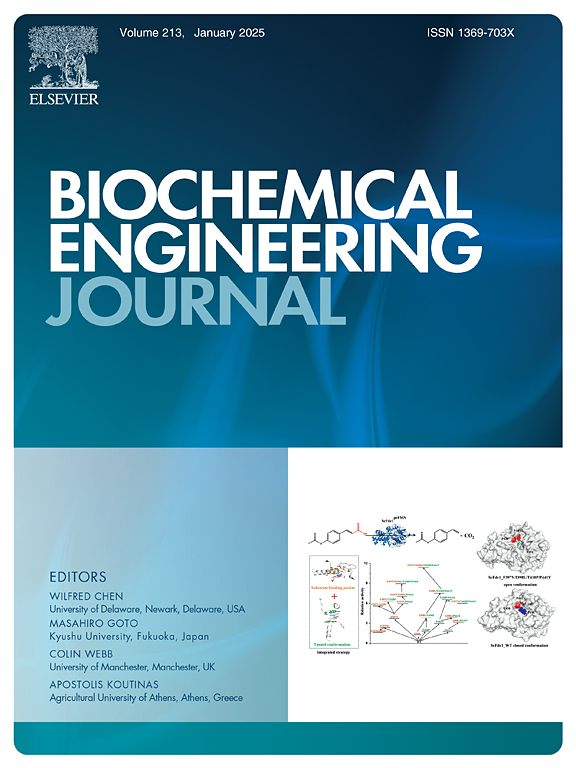工艺参数对工业甲烷生产影响的数据驱动综合分析方法
IF 3.7
3区 生物学
Q2 BIOTECHNOLOGY & APPLIED MICROBIOLOGY
引用次数: 0
摘要
向可再生能源过渡对于解决全球能源需求和环境挑战至关重要。厌氧消化产甲烷是一种很有前途的生物能源。然而,最大化甲烷产量需要精确控制和优化工艺参数。该研究提出了一种综合方法,利用人工神经网络(ANN)进行精确预测,利用粒子群优化(PSO)优化工艺变量,以提高甲烷产量。使用了包括总固体(TS)、挥发性固体(VS)、挥发性脂肪酸(VFA)、碱度(Alk)和pH等关键输入变量的综合数据集。所开发的人工神经网络模型具有较高的预测精度(R²>;0.98)。PSO算法与人工神经网络结合,确定了最优的输入参数组合,使甲烷产量显著提高5.16 %。结果证明了ANN-PSO框架在改善生物能源生产过程中的有效性。通过对优化方案的敏感性分析,研究了不同工艺参数对甲烷产量的影响。本文章由计算机程序翻译,如有差异,请以英文原文为准。
A data-driven approach for the comprehensive analysis of process parameter effects on industrial methane production
The transition to renewable energy is critical in addressing global energy demands and environmental challenges. Methane production through anaerobic digestion is a promising bioenergy source. However, maximizing methane yields requires precise control and optimization of process parameters. This study presents an integrated approach using Artificial Neural Networks (ANN) for accurate prediction and Particle Swarm Optimization (PSO) for optimizing process variables to enhance methane production. A comprehensive dataset comprising key input variables such as Total Solids (TS), Volatile Solids (VS), Volatile Fatty Acids (VFA), Alkalinity (Alk), and pH was used. The developed ANN model achieved a high predictive accuracy (R² > 0.98). The PSO algorithm, coupled with the ANN, identified the optimal combination of input parameters, leading to a significant increase in methane yield by 5.16 %. The results demonstrate the efficacy of the ANN-PSO framework in improving bioenergy production processes. The effect of various process parameter on methane production was studied by performing the sensitivity analysis of the optimized scenario.
求助全文
通过发布文献求助,成功后即可免费获取论文全文。
去求助
来源期刊

Biochemical Engineering Journal
工程技术-工程:化工
CiteScore
7.10
自引率
5.10%
发文量
380
审稿时长
34 days
期刊介绍:
The Biochemical Engineering Journal aims to promote progress in the crucial chemical engineering aspects of the development of biological processes associated with everything from raw materials preparation to product recovery relevant to industries as diverse as medical/healthcare, industrial biotechnology, and environmental biotechnology.
The Journal welcomes full length original research papers, short communications, and review papers* in the following research fields:
Biocatalysis (enzyme or microbial) and biotransformations, including immobilized biocatalyst preparation and kinetics
Biosensors and Biodevices including biofabrication and novel fuel cell development
Bioseparations including scale-up and protein refolding/renaturation
Environmental Bioengineering including bioconversion, bioremediation, and microbial fuel cells
Bioreactor Systems including characterization, optimization and scale-up
Bioresources and Biorefinery Engineering including biomass conversion, biofuels, bioenergy, and optimization
Industrial Biotechnology including specialty chemicals, platform chemicals and neutraceuticals
Biomaterials and Tissue Engineering including bioartificial organs, cell encapsulation, and controlled release
Cell Culture Engineering (plant, animal or insect cells) including viral vectors, monoclonal antibodies, recombinant proteins, vaccines, and secondary metabolites
Cell Therapies and Stem Cells including pluripotent, mesenchymal and hematopoietic stem cells; immunotherapies; tissue-specific differentiation; and cryopreservation
Metabolic Engineering, Systems and Synthetic Biology including OMICS, bioinformatics, in silico biology, and metabolic flux analysis
Protein Engineering including enzyme engineering and directed evolution.
 求助内容:
求助内容: 应助结果提醒方式:
应助结果提醒方式:


